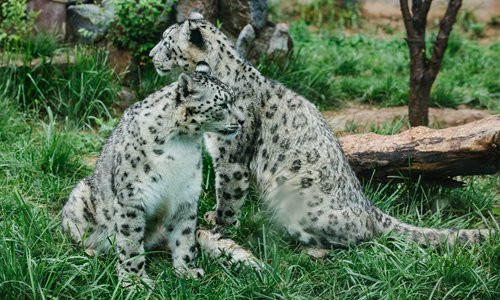
From the People's Daily App.
This is Story in the Story.
Since the 1980s, China has been making all efforts to protect snow leopards, a Class A protected animal in the country. The country accounts for 60 percent of the world’s snow leopard population.
China is considered to be the country that is home to the highest number of snow leopards, with about 2,500. Qinghai alone has more than 1,000.
They have been classified as "vulnerable" by the International Union for Conservation of Nature, an organization that works in the field of nature conservation and sustainable use of natural resources.
George Schaller, a senior conservationist at the Wildlife Conservation Society (WCS), has a different take on the snow leopard population.
According to the Status of Snow Leopard Survey and Conservation China 2018, a study conducted by China Snow Leopard Protection Network - a conservation alliance made up of leading nature conservation agencies, research institutions and universities - snow leopard habitats exist in 12 countries.
In China, snow leopard habitats are mainly found in the provinces of Gansu, Sichuan, Yunnan, and Qinghai, and also in Tibet, Xinjiang Uygur and Inner Mongolia autonomous regions.
Today’s Story in the Story looks at what China has done to preserve the snow leopard, one of the rarest animals on earth.

Qi Xinzhang, deputy head of the Qinghai-Tibet Plateau Wildlife Zoo in Xining, Northwest China's Qinghai Province (Photo: Global Times)
Qi Xinzhang, is the deputy head of Xining Zoo, and in charge of the protection and breeding of snow leopards.
Qi himself is an internet celebrity. His Sino Weibo account, Yuanzhang, which means "round paw", has 1.87 million followers.
He said snow leopards receive far less public attention than pandas. He believes that only through learning and understanding can people love a species.
Qi has loved animals since he was a small boy. In 2009, he graduated with a master's degree in Animal Nutrition and Feed Science from Qinghai University and began to work at Qinghai-Tibet Plateau Wildlife Zoo.
From starting as an animal keeper to becoming the deputy head of the zoo, over the years Qi has been popularizing the science of animals on the internet.
With millions of fans, Qi has become one of the most influential Weibo celebrities in Qinghai Province.
In China, snow leopards are classified as "vulnerable" by the International Union for Conservation of Nature. They live in the Himalayas in Central and South Asia at an altitude of 2,500 to 4,500 meters,
Qi also said that snow leopards live in high-altitude regions, near the snow line. Surveys show that in the wild, there are only 4,000 to 8,000 snow leopards globally.
Xining Zoo has been fostering snow leopards since the 1960s or 1970s. It successfully bred snow leopard cubs in 1984, but the technology was not passed on.

Snow leopards Aoxue (front) and Dabao in Qinghai-Tibet Plateau Wildlife Zoo (Photo: Global Times)
Qi remembers that in 2012, a female snow leopard gave birth to a pair of twin cubs, but the mother rejected the cubs soon after delivery. The breeders in the zoo took over their care but failed to keep them alive for long due to a lack of experience and technology.
What difficulties does the zoo face when it comes to breeding snow leopards?
Qi said that the leopards in Xining Zoo are not in an ideal condition to breed. Some of them were rescued from the wild after being injured or aged.
Moreover, as the only snow leopard breeding base in China, Xining Zoo has very little funding. Medicine and breeding technology can hardly develop.
"From my point of view, having the public's attention focused on snow leopards is far from enough," Qi said noting that the big cats are very precious and play a significant role in the ecology of high plateaus.
"Only when people have very deep concerns for snow leopards can social resources be invested," he said.
He compared the conservation of snow leopards to China's investment in pandas. "The law and scientific research for snow leopards is vastly different from those for pandas."
In zoology, it is believed that people get to know a species before feeling concern for it. "The action brings hope," Qi said.
"With enough concern, snow leopards could gain more attention and social resources. With these, we could expect more research into Snow leopards' protection and breeding," he said.
(Produced by Nancy Yan Xu, Lance Crayon, Brian Lowe, and Paris Yelu Xu. Music by: bensound.com. Text from Global Times and China Daily.)


